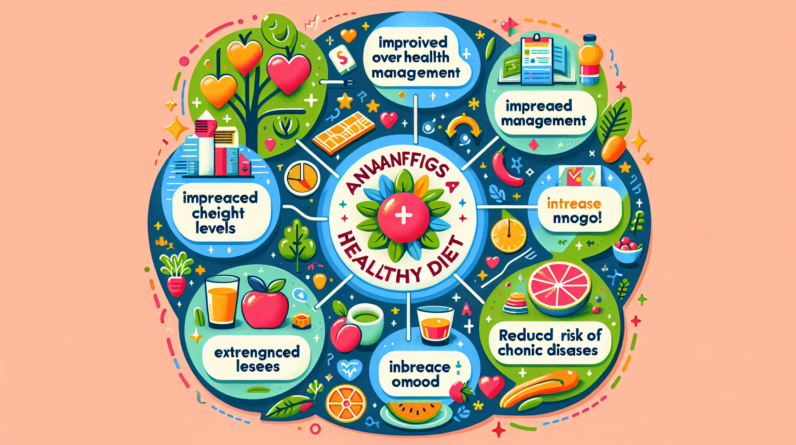
A healthy diet plays a key role in achieving overall well-being and longevity. In today’s fast-paced and convenience-driven lifestyle, it is easy to overlook the importance of nourishing our bodies with nutrient-rich foods. However, embracing a wholesome diet is not only essential for maintaining a healthy weight, but it also reduces the risk of chronic diseases such as heart disease, diabetes, and certain types of cancer. Additionally, a balanced diet fuels our bodies with the necessary vitamins and minerals to support brain function, boost energy levels, and enhance our immune system. This article will explore the myriad benefits of incorporating a healthy diet into our daily lives, enlightening readers about the positive impact it can have on their physical and mental well-being.
The Benefits of a Healthy Diet
Maintaining a healthy diet is essential for our overall well-being. Not only does it make us physically fit, but it also contributes to our mental and emotional well-being. A healthy diet consists of a good balance of nutrients, including proteins, carbohydrates, fats, vitamins, and minerals. By making conscious choices about what we eat, we can reap numerous benefits that have a positive impact on our body and mind.
Improved Physical Health
One of the most significant benefits of a healthy diet is improved physical health. When we consume a variety of nutrient-dense foods, our bodies receive the necessary fuel to function optimally. A balanced diet helps maintain a healthy weight, decreases the risk of chronic diseases, and improves our overall vitality.
Weight Management
Maintaining a healthy weight is crucial for our physical health and longevity. A nutritious diet filled with whole grains, fruits, vegetables, lean proteins, and healthy fats helps us achieve and maintain a healthy weight. By incorporating portion control and choosing nutrient-rich foods, we can reduce the risk of obesity and its associated health problems such as heart disease, high blood pressure, and diabetes.

Reduced Risk of Chronic Diseases
A healthy diet plays a vital role in reducing the risk of developing chronic diseases. Regular consumption of fruits, vegetables, whole grains, and lean proteins can help prevent conditions such as heart disease, stroke, type 2 diabetes, and certain types of cancer. These nutrient-packed foods provide essential vitamins, minerals, and antioxidants that protect our cells from damage and promote overall well-being.
Increased Energy Levels
Eating a healthy diet can significantly impact our energy levels. Nutrient-rich foods provide us with the necessary fuel to power through our day. By incorporating complex carbohydrates, lean proteins, and healthy fats into our meals, we can enhance our energy levels, improve productivity, and avoid the afternoon slump often associated with a poor diet.

Enhanced Mental Well-being
A healthy diet not only benefits our physical health but also impacts our mental well-being. Research suggests a close link between our diet and mental health. Nutrient deficiencies, such as low levels of vitamins B12, folate, and omega-3 fatty acids, have been linked to an increased risk of depression and anxiety. By consuming a balanced diet that includes foods rich in these nutrients, we can support our mental well-being and improve our overall mood.
Improved Digestive Health
Maintaining a healthy gut is essential for proper digestion and overall health. A diet rich in fiber, such as fruits, vegetables, whole grains, and legumes, promotes regular bowel movements and prevents constipation. Additionally, probiotic-rich foods, like yogurt and fermented vegetables, support the growth of healthy gut bacteria, improving digestion and nutrient absorption.
Stronger Immune System
A healthy diet plays a significant role in strengthening our immune system. By consuming a variety of fruits and vegetables packed with vitamins and antioxidants, we provide our bodies with the necessary nutrients to fight off infections and diseases. Incorporating lean proteins, whole grains, and healthy fats further supports our immune system functions.
Better Skin Health
The old adage “you are what you eat” holds true when it comes to our skin health. A nutritious diet can make a significant difference in the appearance and vitality of our skin. Foods rich in antioxidants, such as berries, leafy greens, and nuts, help protect our skin from damage caused by free radicals. Additionally, omega-3 fatty acids found in fatty fish and walnuts can maintain skin elasticity and hydration, reducing the signs of aging.
Improved Sleep Quality
Sleep is essential for our overall well-being, and a healthy diet can contribute to better sleep quality. Certain foods, such as complex carbohydrates and lean proteins, promote the production of serotonin, a neurotransmitter that regulates sleep. Additionally, avoiding stimulating foods like caffeine and alcohol close to bedtime can help improve sleep patterns and ensure a restful night’s sleep.
Improved Mood and Emotional Well-being
The significance of nutrition on our emotional well-being should not be overlooked. A healthy diet provides the necessary nutrients for the production of neurotransmitters that regulate our mood, such as serotonin and dopamine. Incorporating foods rich in omega-3 fatty acids, such as fatty fish, flaxseeds, and chia seeds, can help improve brain health and reduce the risk of depression and other mental health disorders.
In conclusion, adopting a healthy diet brings a multitude of benefits to both our physical and mental well-being. From improved physical health and weight management to reduced risk of chronic diseases and enhanced emotional well-being, the positive impact of a nutritious diet is undeniable. By making conscious choices about what we put into our bodies, we can enjoy the long-term benefits of a healthy lifestyle. Let’s prioritize our well-being by maintaining a balanced diet and reaping the rewards it offers.






